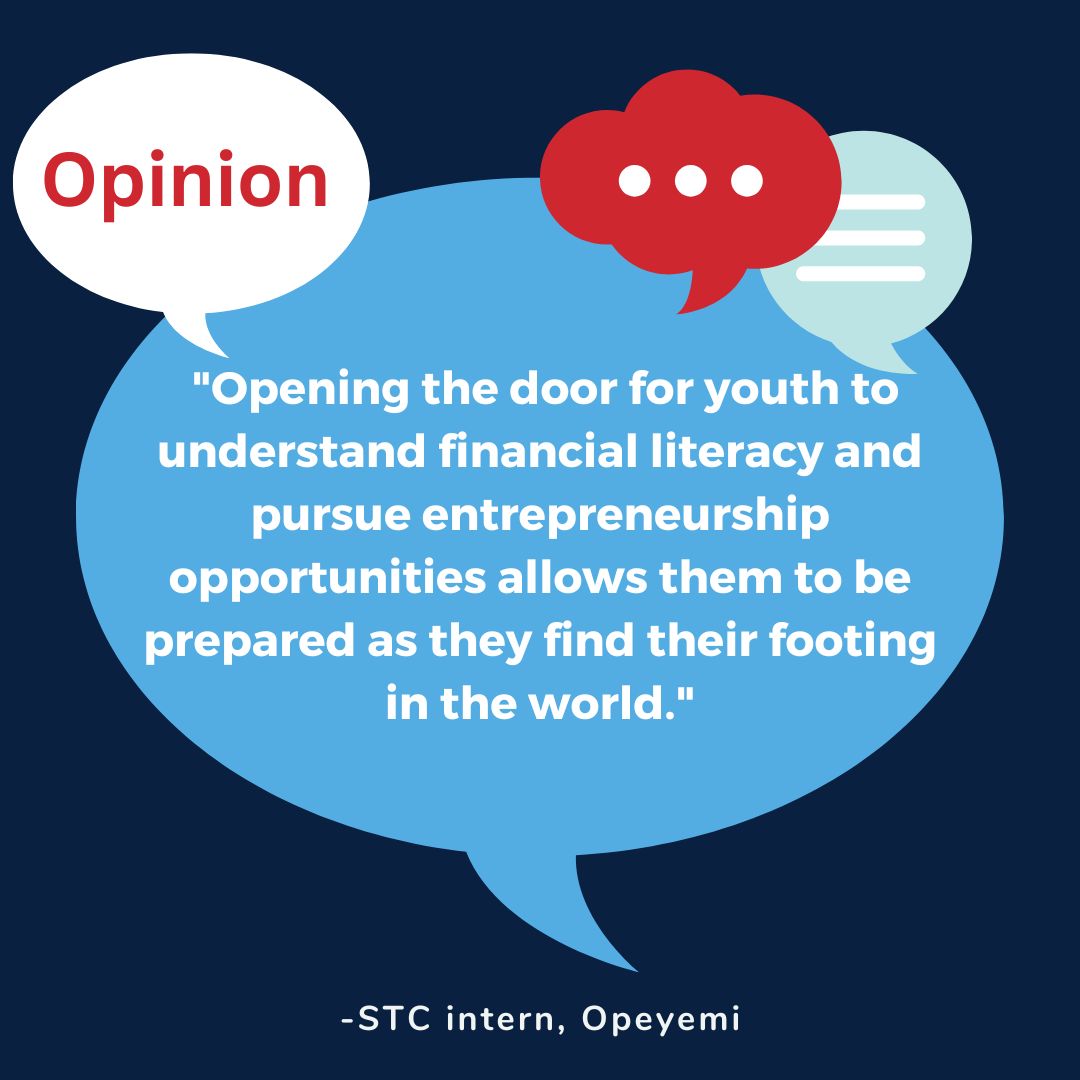
Over the course of their internships, STC interns spent time considering career readiness— what it means for young people today, how it’s packaged, and why it’s important to have youth-centered conversations on work, pathways, school, and more. Here, STC intern Opeyemi explains how entrepreneurship opportunities can help students build important financial literacy skills.
When I was in elementary school, I took every opportunity that I could get my hands on to make my own money. I knew that in order to accomplish my dreams, I wanted to have a successful business and save up as much as I could. I learned how to make loom-bloom bracelets, and would sell them to my classmates. Then, I’d use some of the money earned to buy sweets and sell the sweets. I saved up my money for things I felt were valuable to me at the time. And to this day, I still carry every lesson I’ve learned from my small business and apply it to myself every chance I get. Even though I don’t have nearly enough money to buy a mansion, I have learned to save up effectively.
As a double major in business analytics and marketing, financial literacy is everything to me. Since college is around the corner, it’s time to really understand that even though mom and dad are around, I should still know how to save the money that I’ll be getting from my job for my long-term goals, like getting my first apartment when I graduate or my first car. That’s what I’ll be working toward while also spending effectively for books, whether for school or just to add to my personal collection, supplies if I run out, and money to go out here and there, because it’s okay to treat yourself every now and then.
The understanding of financial literacy doesn’t just help you develop entrepreneurship skills, but also builds you up financial stability. Gaining exposure to this at a young age helps prepare you for the adult world, allowing yourself to practice this skill set and adapt to it so you’re set up when it’s time to buy a car, a house, or even pay for college.
Opening the door for youth to understand financial literacy and pursue entrepreneurship opportunities allows them to be prepared as they find their footing in the world. Some estimates say only 14 states mandate personal finance education for high schoolers. Plus, some experts say that just looking at study materials isn’t enough to impact financial literacy and understanding in students. Instead, according to Forbes, students need “a real world component where they can test concepts with their own money and through their own real-world lens.”There is so much to gain from educating youth on the importance of financial literacy, including money management skills to help budget your funds to pay for gas, bills, food, transportation.
Students want to talk about money. A survey reported that half of students who responded said they’d talked to their friends about investing in the stock market.
Some students have started their own businesses. I’ve heard of students starting clothing businesses or even food businesses. Students in Rhode Island created and operated food trucks as part of a CTE class, where they learned skills in entrepreneurship, culinary arts, and more. Who knows where your talent may take you.
A lot of adults learn the hard way about the importance of saving money, because we are taught to get a job and spend the hard-earned money instead of saving up and using the money for something beneficial. Some research shows that about 60% of people in America live paycheck to paycheck.
Some may argue that children shouldn’t be taught about financial literacy until they are older. But there are ways to help young people ease into learning about financial literacy and budgeting so as they get older, they have a better understanding of the financial world. Using simple saving methods such as the piggy bank jar is a great mechanism to teach kids the importance of spending and saving.
For students who are a little older, entrepreneurship is a great first step to get young people active in learning about financial literacy and money management. Some schools push their kids to embrace financial literacy or help them start up their own business by opening up workshops for braiding, nails, cutting hair, and sewing. Having student-run businesses in schools also supports communities, and lets students lead. Through that, students learn important skills in:
Time management
Networking
Critical thinking
Innovation
Teamwork
Growing up, I knew that I would want to major in the business field due to my hustle mentality. Now I’ll be teaching middle and high schoolers in New York about financial literacy in the fall when I go to college. I’ve not only cherished every business lesson that has landed on my lap, but have used it to continue to improve my money management skills, and ultimately set myself up for success in the near future. I believe that if others have the same opportunities they’ll be able to meet their goals along the way. But this can only be achieved if everyone is willing to put in the work, which is why I am advocating for the introduction of financial literacy classes and more entrepreneurship opportunities for students, whether it is starting up your own business or learning about how others succeed in their businesses.

